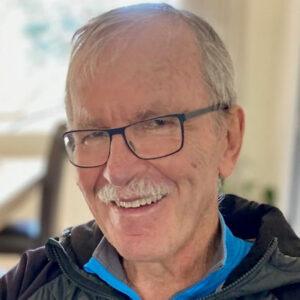Bob Murdoch was a skilled hockey player who spent 12 years in the NHL with the Canadiens, Kings, and Flames, winning two Stanley Cups. A successful decade of coaching followed, earning the Jack Adams Award as the NHL’s Coach of the Year in 1990. Bob lived a happy, full life surrounded by family and stayed active with hobbies including gardening, traveling, and fishing. In his early 70s, he began to experience mild cognitive changes and started depending on his wife to get around. When he passed away in August 2023 at the age of 76, Bob’s brain was donated to the UNITE Brain Bank where researchers diagnosed him with stage 3 (of 4) CTE. Below, the Murdoch family shares Bob’s Legacy Story in the hopes they can help save future lives.
Bob Murdoch was born on November 20, 1946, in northern Ontario, Canada, the youngest of three siblings. Growing up in a small community, his family embraced an outdoor lifestyle filled with activities like baseball, football, skiing, and hockey. From an early age, Bob developed a passion for hockey, becoming exceptionally skilled at the sport.
Though he had the chance to attend an American college, Bob chose the University of Waterloo in Ontario, where he played hockey alongside his childhood friends and earned a dual degree in Mathematics and Physical Education. His contributions to the school were later recognized when he was inducted into their Athletic Hall of Fame.
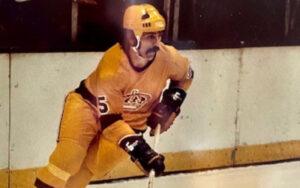
Known as “Mud” on the ice, Bob represented Team Canada and was later signed by the Montreal Canadiens, launching a remarkable 22-year NHL career that included two Stanley Cups. He played for several teams, including the Los Angeles Kings, Atlanta Flames, and Calgary Flames. After retiring as a player, Bob transitioned to coaching, leading teams such as the Flames, Chicago Blackhawks, Winnipeg Jets, and San Jose Sharks. His coaching prowess earned him the Jack Adams Coach of the Year award in 1990 for his work with the Jets. Bob also fulfilled his dream of coaching internationally, for six seasons in Germany, as well as some Olympic and World Championship events. At age 55, Bob decided to retire to spend more time with his family.
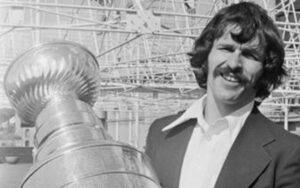
Bob married in 1972 and had four children from his first marriage. In 1986, he married his current wife, Bev, with whom he had two more children. Bob was a devoted husband, father, and grandfather, leaving a lasting positive impact on everyone he met. His infectious smile, quick wit, and playful humor endeared him to many.
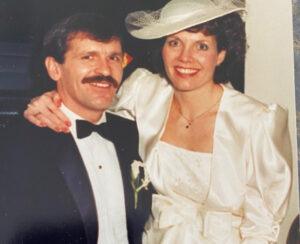
In addition to family time, Bob enjoyed traveling, fishing, gardening at his summer cottage, cross-country skiing, and playing old-timers hockey.
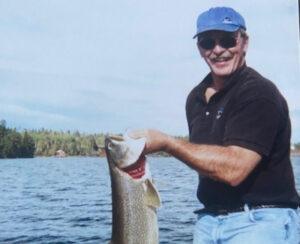
Around the age of 65, Bob developed atrial fibrillation, a condition which ran in his family. He began experiencing vivid dreams of fighting other hockey players and, after struggling with snoring, eventually got a CPAP machine for sleep apnea. Despite these health issues, Bob did not connect them to dementia or CTE.
In 2017, a memory test showed Bob scored 30 out of 30, reassuring the family there were no immediate concerns. However, in late 2018, a neurologist noted some irregularities in his movement and suspected mild Alzheimer’s disease. Subsequent MRI and PET scans in mid-2019 led to a diagnosis of probable Lewy Body Dementia and Alzheimer’s. Although CTE was discussed, it could only be confirmed post-mortem. Given Bob’s lengthy career in contact sports, the family suspected CTE might be a factor.
Despite the diagnosis, Bob remained resilient, continuing to travel and spend time with family. In early 2019, he underwent a right knee replacement and worked hard to return to old-timers’ hockey, but after just two games, he suffered a shoulder injury that ended his playing days.

Though Bob’s cognitive abilities remained stable, both his neurologist and family doctor advised him to stop driving due to worsening eyesight. He had always struggled with vision issues, stemming from a “lazy left eye” diagnosed at age five, and despite two major eye surgeries, his vision did not improve.
Over time, Bob became quieter and less his usual witty self. He stopped driving both his car and boat, and in 2020, the difficult decision was made to sell their cottage. They relocated to Canmore, Alberta, closer to medical facilities and family support. This transition felt like a series of losses, not unlike grieving.
By the summer of 2021, Bob’s condition had deteriorated significantly. Sleep became elusive, and he experienced frequent awakenings and violent hallucinations. It became necessary to place him in a private care facility near his home, with support from the NHL Alumni staff during this challenging transition.

Bob entered long-term memory care in January 2022 but was hospitalized for over three months due to rapid progression of his illness. Despite never being aggressive, he exhibited threatening behavior during episodes, leading to police involvement. In the hospital, Bob faced confusion and worsening delusions. After a fall which resulted in a broken hip, he was transferred to a complex dementia care facility, where he never walked again.
On August 3, 2023, the family was called to be with Bob due to a GI bleed. He passed away later that day at the age of 76, surrounded by loved ones, filling the room with warmth and love.
Following his passing, Bob’s brain was donated to the UNITE Brain Bank for research. By March 2024, the neuropathology report revealed severe brain atrophy, CTE stage 3 (of 4), Lewy Body Dementia, Alzheimer’s disease, and TDP (ALS). The family expresses gratitude to the Boston University CTE Center and the Concussion Legacy Foundation for providing closure and a deeper understanding of Bob’s illness, knowing their research will help save lives in the future.
